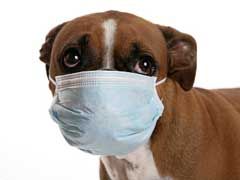 Canine influenza virus, also called dog flu, is an extremely contagious airborne disease. It is easily transmitted by direct contact, and aerosolized through coughing, sneezing, and barking. It can also be transmitted indirectly through objects such as food/water bowls, collars, leashes or kennels that have not been disinfected properly. People that have been in contact with sick dogs can carry canine flu on their clothing for up to 24 hours and on skin for up to 12 hours. When caring for a sick dog, protective clothing should be worn, gown, gloves, shoe covers.
Canine influenza virus, also called dog flu, is an extremely contagious airborne disease. It is easily transmitted by direct contact, and aerosolized through coughing, sneezing, and barking. It can also be transmitted indirectly through objects such as food/water bowls, collars, leashes or kennels that have not been disinfected properly. People that have been in contact with sick dogs can carry canine flu on their clothing for up to 24 hours and on skin for up to 12 hours. When caring for a sick dog, protective clothing should be worn, gown, gloves, shoe covers.
There are two strains of the virus. The H3N8 strain is the influenza virus that is most vaccinated for in our area. This vaccine is administered if your dog visits dog parks, kennels, doggie day care or groomers. Outbreaks of the second strain, H3N2, have occurred in Florida, Georgia, Louisiana, and Illinois. If you travel with your dog or he is a show dog we will vaccinate with the newer vaccine that protects against both strains. No one knows if this strain will travel further north but it may be likely since people travel a lot with their pets.
SYMPTOMS
The most common symptoms of dog flu are a persistent cough, nasal/ocular discharge, sneezing, lethargy, anorexia and fever. Just like when you have the flu your dog feels crummy. Therefore, a visit to your veterinarian is important as soon as symptoms occur. Because of the highly contagious nature of the virus our veterinary office may ask you to leave your dog outside and away from other dogs. When your dog is brought into the exam room our disinfecting begins. Wherever he walked the floor will be cleaned with a bleach solution and left for 10 minutes before another dog can be exposed to that area. After the sick dog’s visit the entire exam room will be disinfected and no dogs allowed in that room for 48 hours.
TREATMENT
The canine influenza viruses are treated with antibiotics and sometimes cough suppressants. It can take two to four weeks for complete recovery. Untreated dogs can develop pneumonia and require hospitalization. Sick dogs should be isolated from other dogs up to thirty days after symptoms subside.
PREVENTION
The best prevention is to vaccinate against the influenza virus, H3N8, especially if he is exposed to other dogs at kennels, doggie day care, groomers and dog parks. If your dog travels with you, is a show dog or competes in obedient competitions he should be vaccinate with the bivalent vaccine which protects him from both H3N8 and H3N2 strains of the canine flu. The vaccine is a series of two vaccines, the first provides protection for about three weeks then needs to be boostered at that time. The full immunity is approximately one week following the second dose. Then the vaccine is administered once yearly.
For more information go to: https://www.cdc.gov/flu/other/canine-flu/keyfacts.html







